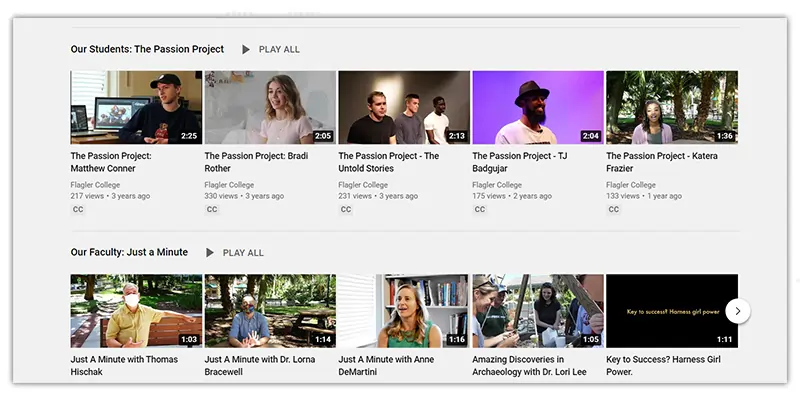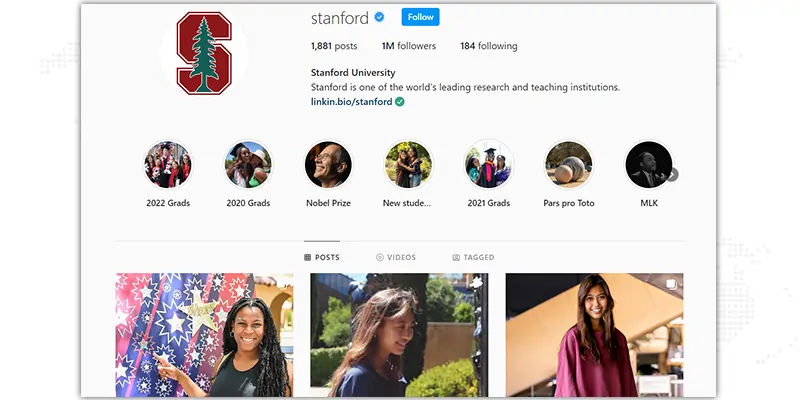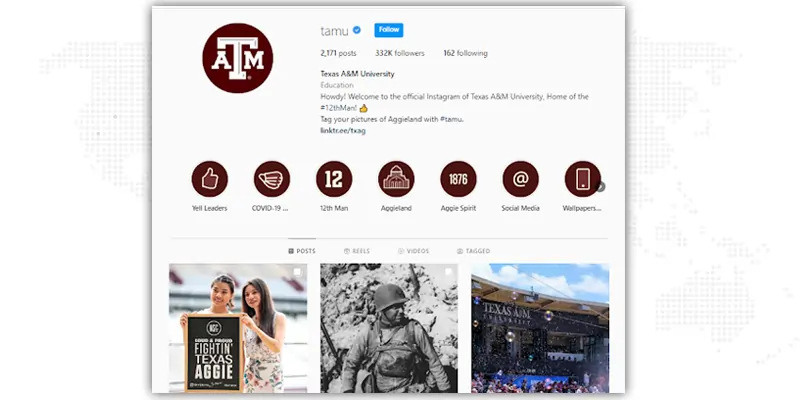
COVID-19 was a new challenge for colleges and universities in 2020
In 2021, the pandemic's effects were still being felt. This has put higher education marketers under more pressure to increase enrollment as a result of these declines at universities, colleges, and other tertiary institutions.
Higher education marketing refers to the process of marketing any degree that goes beyond a high school diploma. Many people attend colleges and universities, from those just finishing high school to those pursuing advanced degrees and professional certifications.
Higher education institutions must use a wide variety of digital marketing services to reach as many potential students as possible because of the wide variety of their target audience. In such a crowded market, it's critical to have a solid marketing plan in place.
Many academic institutions are restructuring and improving their digital marketing strategies in an effort to pique students' interest in their courses and degree programs.
Looking for Digital Marketing Services?

Every year, a new class of high school seniors enters the university system, eager to begin their college careers. All around them, they are bombarded with brochures and speakers who are trying to persuade them to attend a particular college or university. All of these are aspects of higher education marketing that prospective students consider when making their final college choice. If a school's marketing strategy is on point, it can set itself apart from the competition.
Many people, not just students, are enticed by a well-executed marketing strategy. Parents and others who help students make decisions are also important to market to, as their influence can be an important factor. Teachers and faculty can be attracted to a school with a strong marketing strategy. As a result, a school's enrollment and reputation can rise as a result of all of this.
Here are a few strategies for increasing enrollment in higher education that you can start using right away to get the ball rolling. In addition, using these methods will help you build a strong marketing strategy.
Work on your value proposition and messaging before anything else. Students have put their educational plans on hold due to the recession and an uncertain economic future. Colleges and universities need to demonstrate the value of their degrees and help students understand how they apply in the real world when the college degree is constantly being questioned. Now more than ever, a person's ability to maintain a successful career is crucial.
Your value proposition and educational content should be honed now so that students know their chosen path will lead to a promising future. You need to do more than just tell students they'll succeed; you need to demonstrate it. That means creating case studies, testimonials, and data to support your claims. Here are a few ways to spread the word:
If you don't know how your students are doing after they graduate, you need to make that a top priority right away. Make use of your network of former students and colleagues and pay attention to what they have to say. In addition, your marketing campaigns should focus on highlighting the value students gain from attending your school.
High-profile endorsements can be used to promote your college. Influencer marketing is a lot like this. Marketers can use famous graduates in ads and content because most universities have them. You can also get in touch with these well-known former students to serve as brand ambassadors for your school on television or online.
Academic institutions' alumni employment track records have been shown to have an impact on prospective students' decisions. Using social media and your website to showcase the accomplishments of your alumni and current students is a great way to attract new students as well as current students.
High-profile students can also be used as social media ambassadors and influencers by higher education marketers. This will help your school's visibility on social media.
The activities of Flagler College's student ambassadors are documented on a dedicated YouTube channel. This is a great example of self-generated, natural content.

The use of social media by colleges and universities to reach out to prospective students is an absolute necessity. Over 3.1 billion people use social media platforms, according to Emarsys. 42 percent of the world's population is represented by this number. Instagram and Facebook are the most popular social media platforms, according to the latest findings. In addition, TikTok, a new social media platform, is gaining traction among a small but growing number of people.
Take a look at the Instagram pages of Stanford University and Texas A&M University. Both provide a glimpse into campus life for potential students. All of these aspects of college life are featured in these photographs. This gives prospective students a better idea of what it's like to live on campus and increases their likelihood of enrolling.


Let's take a look at some of the most effective social media marketing methods for increasing enrollment.
More than 80% of millennials, according to a study, are swayed by user-generated content. Your institution can use social proof to build a strong social media presence by using specific hashtags on social media. There are hashtags for current students and alumni alike to use in order to share their experiences on and off the college campus. Department and event hashtags can also be created and promoted.
A directory of social media accounts used by your school's various departments, schools, and administration should be created for easy access on your school's website. Students can instantly stay on top of current events. Using this approach, NYU has had a great deal of success.
Thus, it shows your educational website should be up to date with your social media accounts for your marketing purpose.
It's a great way to show prospective students what it's like to be a student at your school by highlighting student activities on your social media accounts.
Showcase the accomplishments of your students and faculty on your social media platform. Students can see themselves succeeding at your school by picturing themselves as a student there. More people will enroll if they see that students have a strong support system and that they are succeeding after they graduate.
Show off your campus on social media if it's beautiful. Take pictures of public areas, such as lawns, outdoor study areas, and beautiful buildings, to remember them by. Students' lives are shaped by the campus environment, and this is especially true when it comes to their decision-making process.
Higher education marketers can use video chats for Snapchat, Facebook Live, and Instagram Stories to promote their institutions. Classes, events, and even Q&A sessions can all be streamed live. Live streaming is a great way to connect with Gen Z and build strong relationships with potential customers.

This is why video ads for higher education are so effective. More than a billion people use Facebook daily, making it an ideal platform for video ads. It appears that video ads outperform their image counterparts when it comes to both ad views and clicks. As a result, video content results in higher click-through rates because it requires users to process the information they're viewing before they continue their scroll. Facebook video ads are a great option for higher education marketers looking for the best advertising channels.
It's not enough to have a website any longer. You won't get any visitors if people can't find it when they search for it. So if you want a steady stream of visitors to your website, you'll need to raise your site's search engine rankings.

For higher education marketers, here are some common SEO strategies to implement in 2022 for higher education lead generation:
Any SEO campaign relies heavily on keywords. Therefore, a university's website should use keyword research to determine the best phrases to optimize for in order to achieve high organic search rankings.
Having content and web pages dedicated to a specific topic is necessary if you want to rank highly for that keyword. The quality and relevance of the content on the websites of colleges and universities cannot be compromised. Consider the concerns of potential students and the information they are looking for. You'll do better in organic search results if you create content that addresses these concerns.
Students are more likely to visit a college or university's website if it has a compelling meta description. In addition, the page title and meta description can help persuade a potential student to click on your link in their search results.

In 2022, the following SEO tactics will be critical:
Higher education marketers can benefit greatly from the use of blogs as part of their content marketing and search engine optimization strategies. When a blog is popular, it attracts a lot of readers, and its posts are seen by a wide audience.

Higher education institutions can use blogs to promote their brand and build relationships with prospective students. Think about how you can connect with both prospective and current students when developing your content strategy.
Here are some examples of how academic institutions can reach a wider audience through blog posts:
University homepages are frequently visited by students who are looking for a college or university to attend. User experience (UX) and performance should be optimized for both desktop and mobile devices in order for a website to succeed. Delivering a mobile-friendly experience is essential to ensure that your content can be accessed both at home and on the go.
Improve your university's student enrollment by optimizing your website. Most search engines use page speed to determine a site's page rank. Search engines like Google aim to provide the best possible results. If a website is slow to load or has an unsatisfactory experience, users will avoid it (UX). If your website takes a long time to load, your search engine rankings will suffer as a result of this.
Potential students will be happier, more engaged, and more well-informed if your website loads quickly and is easy to navigate.
Email marketing has been overlooked by some marketers, who believe it is a waste of time. This couldn't be further from reality. However, email marketing is still very effective, as evidenced by the fact that several organizations have begun using it.

There are many disadvantages to using cold emailing, such as the fact that many prospective students will simply delete your message.
As a result, how can higher education marketers ensure that their emails do not end up in the spam folder?
Send leads emails that are relevant, personalized, and segmented. This is a proven method for increasing the number of people who engage with your content and improving the overall quality of your content. Targeted personalization is one of the best ways to improve user experience and increase engagement, according to a report from Econsultancy.
The best time to send an email to anyone you've previously sent an email to can be determined using specialized tools.

The use of interactive advertising in higher education marketing offers a wide range of possibilities. It's possible to use interactive ads to reach and engage potential students and get them to tell you exactly what they're interested in studying. When it comes to increasing student enrollment, this is yet another area that is just beginning to take off.
A student might come across an advertisement from their prospective school via social media in the form of an interactive game. Entering in an email and name is all that is needed to begin interacting with a quiz or other game that gives the school an idea of what the students care about most.
Another option is to create a video ad that follows new students as they begin their academic careers. The viewer has a hand in deciding what the student does and how the story progresses as they make their own decisions.
Prospective students' search histories can be used to target banner ads on popular websites or the Google display network. Banner ads should also include videos, GIFs, and photos that are likely to entice new students.
Prospective students expect to receive a response from an academic institution within 24 hours of submitting an application. By failing to respond to inquiries within five minutes, colleges and universities are ten times more likely to lose out on future business.
In order to ensure that prospective students receive a quick response, you can use chatbots. In addition, in order to respond to frequently asked questions, admissions representatives could use chatbots to do so quickly. Finally, if it is determined that individual response is needed, the conversation can be transferred to an actual person.
It doesn't matter what industry you're in; branding is essential. A school's brand helps prospective students understand what your institution is all about. Defining who you are means letting people know what makes your school special. Many students have difficulty distinguishing the brands and mission statements of different schools. This is an opportunity for an institution to rise above the rest of the pack.
It's important to create a brand that represents both the school and its student body when it comes to higher education. Despite the fact that many schools have a lot in common, each one is unique. There are many aspects of your institution that can be highlighted as part of your brand, including your programs, history, location, people, and faculty.
Think about who you want to attract to your institution and what will entice them to enroll. Make sure it's genuine before anything else. Make sure you don't paint a false picture of what life is like on campus. When it comes to marketing, it's just as important to keep customers as it is to attract new ones. There are higher education lead generation companies out there to help you establish a branding strategy for your school or university.
It's time to add live streaming to your digital marketing arsenal for colleges and universities. It's possible to deliver live video content to prospective students via multiple platforms, such as Facebook, Instagram Live, and YouTube. Classes, lectures, and Q&A sessions with students and faculty can all be streamed using this technology. In addition, students can get a firsthand look at what an institution is like by watching these live streams, which can help build your brand.
In the event of a COVID-19 pandemic in 2021, live streaming has, without a doubt, become an even more important means of reaching prospective students. In addition to conducting campus tours, speaking to groups of interested students, and conducting classes from afar, schools can use live streaming to do so. The use of this technology is essential to any marketing strategy for higher education.
Word-of-mouth advertising for higher education is one of the most effective methods available. According to many prospective students, no matter what an institution claims about itself, the words of those who have actually attended are far more valuable. A school looking to increase student enrollment should look no further than its current and former students for marketing strategies.
Students and alumni can help spread the word about a school by writing reviews on various review sites. In addition, their experiences at the school and how they benefited from it can be featured in videos or profiles on websites or social media.
In 2022, marketing for higher education will benefit from a focus on distance learning. For the time being, COVID-19 will be a part of our daily lives, and many students will be looking for ways to avoid having to go to a campus. A plan for dealing with the pandemic on campus is essential, but a plan for students to learn from home is a way to open up possibilities. For the first time, schools can gain access to students who were previously out of their reach.
By itself, offering distance education shows that a university cares about student and faculty safety, earning the school a positive reputation. As a result, students who are interested in distance learning are more likely to select your school over one that does not offer the option or provides a less robust option.
In addition, students who are unable to leave their homes because of family or other reasons may be able to attend your school through distance learning. Distance learning aids a school's enrollment marketing strategy during and after this pandemic by increasing the number of potential students.
Pay-per-click advertising is still an important tool for online marketing in higher education. Prospective students can be micro-targeted with ads that are relevant to their search history. Multiple ad platforms, such as Facebook Ads, Bing Ads, and Google Ads, can be used in a PPC campaign to promote higher education.
With mobile devices, it's possible to target ads to specific people based on their physical location. There are a number of ways you can tailor these campaigns to your institution's needs. For higher education marketing, it is important to use a variety of ad strategies that target specific groups of students. Google search has a high return on investment, while interactive ads are more likely to get students interested in the ad.
As part of a marketing strategy for higher education, there are five main types of digital ads:

Higher education marketing is critical to help schools meet the challenges they face and succeed in today's competitive marketplace. As a result of the implementation of COVID-19, schools now have new options for marketing and running their classes. We sincerely hope that this article is useful in achieving your goals.
As a higher education marketing agency, JanBask Digital Design can help you design a strategy that includes building a brand, designing an efficient website with an excellent user experience, and marketing in a variety of ways to potential students.
It's a constant battle for higher education marketers to find new ways to bring in more students. These marketing strategies can set you apart from the competition and help cultivate closer ties with current and potential students.
Interested in our Digital Marketing Services?

H
Excellent strategies. Loved reading it.
J
Thanks you found it useful.
P
Could you share some more examples of higher education strategies?
N
Nice article.
B
What is the most effective strategy out of these 15 strategies?
J
Thanks for your feedback! You can contact https://www.janbaskdigitaldesign.com/contact-us for your queries.
B
Thanks for sharing your views.